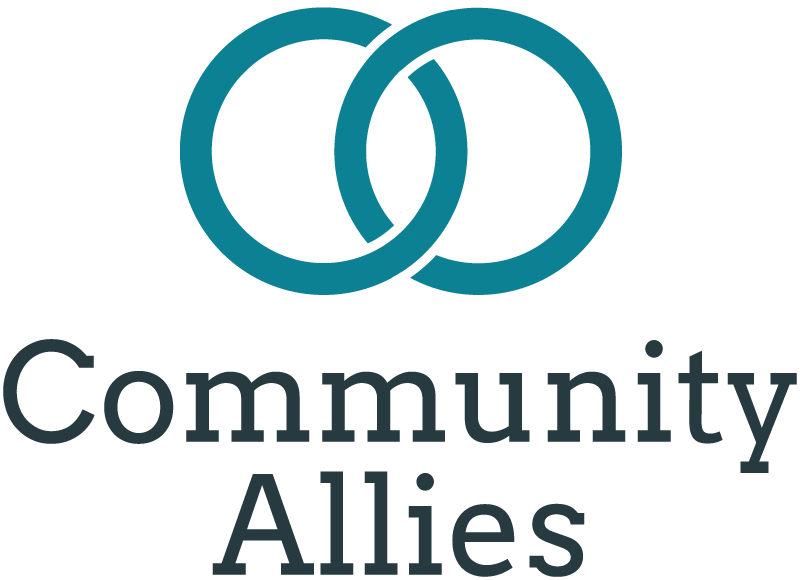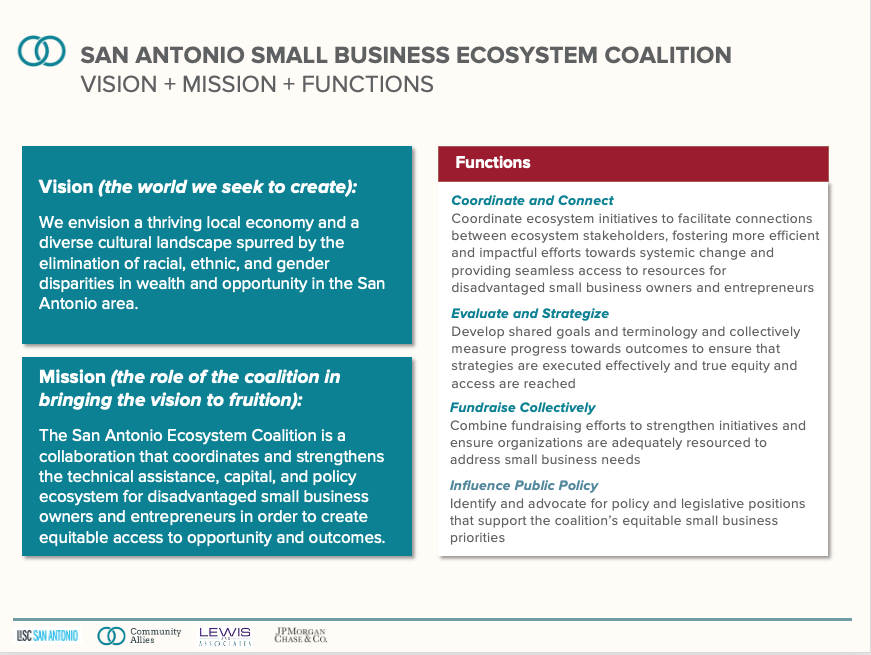LISC San Antonio
San Antonio, TX
Challenge
In 2020, San Antonio’s small businesses faced a set of unprecedented challenges. San Antonio is racially and ethnically diverse, with a culture built on multiple waves of immigration that have resulted in rich artistic, architectural, and entrepreneurial traditions. However, San Antonio small business owners of color struggled to access the resources and capital to sustain their businesses long term. The COVID-19 pandemic, uprisings stirred by acts of racial injustice, and natural disasters all exposed the vulnerability of the region's small business sector, with the harshest consequences falling on small businesses owned by people of color.
In the summer of 2020, San Antonio was one of the seven cities included in the Common Future small business ecosystem assessment, for which Community Allies led community engagement. In each city, the study revealed racial disparities in small business ownership, profits, size, job creation, and access to capital. In San Antonio, additional challenges included insufficient resources for business development organizations, a lack of coordination among local funders, and a history of small business ecosystem players being divided across lines of race, class, and geography. Following the assessment, Community Allies was engaged in San Antonio as leads for a multi-year project to align all of the players within the small business ecosystem around a common vision and a strategy to build more equitable access to opportunity and outcomes for small business owners of color.
Approach
Community Allies partnered with the San Antonio LISC office in a multi-phase project in which we facilitated small business support entities in coordinating their efforts, building a strong and supported local ecosystem, and creating more effective and accessible support to small business owners of color. These initiatives were based in our belief in the power and good of locally-based economies and our deep conviction that solutions should come from the community itself. We took a similar approach in each phase of the work in San Antonio, guiding members through activities to generate ideas in a communal manner, ensuring all voices were heard and that any decisions came from the group itself. During the first phase of work, in three full community meetings and multiple interstitial meetings and conversations, we guided the group through the process of writing a communally-generated mission, vision, functions, and governance structure for an ongoing coalition to provide financial and technical assistance to small businesses, as well as resourcing the local organizations that provide those services. We also supported them as they engaged in more time-sensitive advocacy efforts to focus ARPA dollars on small business support.
Before any deep work building forward could be done, we needed to guide the group towards greater cohesion, to help the members connect past long-existing barriers of race, class, and power. We used a What If? exercise to surface unspoken concerns about why the project might fail before mining the experience of the members to create a list of best practices for effective coalitions. We were particularly aware of our own positionality in this process, as an outside consultant firm brought in to do work in a struggling local ecosystem, and built in opportunities for anonymous commentary so that participants could express any concerns about our own involvement.
The next phase of work in San Antonio built on the goals developed by the ecosystem coalition, along three primary tracks:
Business Support Network: Based on feedback that business support providers have their own unique challenges, we convened a separate Business Support Network (BSN) including local chambers of commerce, place-based BSOs, and other non-profits. We helped them to establish connections, personally and organizationally. Knowledge of each other’s organizations helped to identify areas of overlap as well as distinct areas of expertise, while individual relationships increased the likelihood that the organizations will work together and refer clients to one another. Using the “Waters of Systems Change” models, the group identified leverage points for systemic change in different areas and identified roles their organizations could play in building a stronger local small business ecosystem.
Small Business Ecosystem Coalition. We then re-convened the larger ecosystem group, including policy makers, capital providers, funders, and anchor institutions. We re-grounded members in the vision and mission they had developed and guided them in exercises to prioritize collaborative initiatives towards the vision of eliminating racial, ethnic, and gender disparities in wealth and opportunity in the San Antonio Area. They formed working groups that met outside of the large meetings, to refine each of the priorities and begin to take ownership of the work. We also fostered individual connections by asking attendees to commit to following up with someone they met that they wanted to work with and had not known before. This phase of the Coalition’s work ended in a joint meeting with members of the Funders Network.
Funders Network. Philanthropic funding has historically been thin in San Antonio, particularly for economic development. There has never been a local coordinated philanthropic effort to support small business owners of color. By bringing local funders together in a cohort, we aimed to establish an ongoing group to resource the Ecosystem Coalition’s priorities. We supported the Funders Network members in sharing their individual goals and current efforts around economic development and in identifying where pooled or aligned funds could amplify their impact.
Results
With its agreed-upon mission, vision, and priorities, and buy-in from over nearly seventy business support groups, the San Antonio Small Business Ecosystem Coalition has secured over $4M in initial funding, covering administrative and backbone support, programmatic support, and contracts and training with individual business development organizations to grow their programming. The Funders Network is in the process of identifying areas for coordinated or pooled efforts.
One of our central beliefs at Community Allies is that all communities, including business ecosystems, are more powerful and more equitable when they are formed out of strong relationships between people. A primary goal in San Antonio was to strengthen ties between ecosystem members, many of whom had been working in silos or competing where they could have been working synergistically. We tracked numerous new relationships and collaborations between organizations and people who did not know each other before these meetings. The attendees themselves confirmed this: after the first meeting of the BSN, we polled the attendees and found that fully 100% said they had met someone they did not know before with whom they would follow up for future work. In the words of one attendee, “We need to get competition out of our heads. We want to help, not to put additional steps and space between us and the populations we serve.”
“Community Allies has been an invaluable partner in our small business ecosystem development work. Ellen has an unwavering commitment to equity and amplifying community voice, which shines through in her facilitation style and her policy and program recommendations.”
Put Community Allies to work for you
Share this story:


